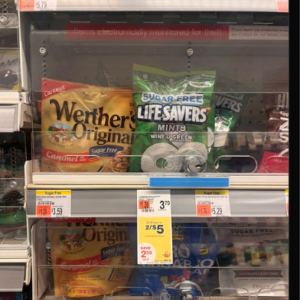In San Francisco, shoppers complain that make-up and mascara are under lock and key. In New York City, some stores even keep cough drops behind security bars.
“They’re locking up my toothpaste!” activist Al Sharpton recently complained on MSNBC.
Across the nation, retailers are adding more on-the-shelves security to fight off the surge in shoplifting, and shoppers aren’t happy. Some stores are even shutting down entirely, knocked out of business by the one-two punch of increased theft and declining sales. Frustrated shoppers are leaving stores rather than waiting for a clerk to give them access to toiletries and beauty supplies.
Stores say they have no choice. Last month, staffers at a New York City Ride Aid told the NY Post that thieves stole more than $200,000 in merchandise in December and January alone — part of a scourge of shoplifting that has been reported citywide.
“They come in every day, sometimes twice a day, with laundry bags and just load up on stuff,” an employee said. The company announced the store’s closing earlier this month.
But before blaming the problem on local teens pocketing perfume without paying, law enforcement sources say it’s not casual shoplifters who are responsible for the locks on the body lotion. It’s organized criminal gangs.
“Retail crime and shoplifting are not ‘victimless crimes’,” says Alysa Erichs with United to Safeguard America from Illegal Trade (USA-IT), an organization that fights illicit commerce. “Criminals do not care who or what lies in their wake as long as they’re making money, and it affects all of us (because) organized crime groups use their profits to bolster operations, bringing more crime to our neighborhoods.”
The scale of the organized retail crime (ORC) problem is massive, even impacting the stock prices of some major retailers. According to the National Retail Federation, retail theft costs American businesses nearly $100 billion. The problem has caught the eye of some in Congress.
“Illicit trade and goods often end up funding drug trafficking, organized crime, and other criminal enterprises, and with the explosion of e-commerce in recent years, the amount of counterfeit goods being imported in the United States continues to grow at an alarming rate,” said Rep. Bennie Thompson (D-Miss.) at a recent conference on the issue.
Cara Convery heads Georgia’s Gang Prosecution Unit. “Criminal enterprises are in the market to make money, and they’ll do that by any means necessary,” Convery said.
And it is no coincidence teens are committing much of the organized shoplifting or smash-and-grab retail crime.
“Young people are at the foundation of the organized retail piece because, if they can avoid it, older people in the gang are not going to go into the store themselves, and they’re not going to the gas station to break in the car,” Convery said. “They also, unfortunately, learn that the juvenile exposure in our criminal justice system is significantly less, so if they get somebody arrested — especially for something like shoplifting where somebody’s not looking in the bigger scheme — they’re going to be out the next morning, they may not even go to juvenile court, and that’s another worker back on the street for them to make more money the next day.”
And while the U.S. government works to target bad actors and prevent illicit criminal networks selling everything from stolen goods to fentanyl, Thompson said bad actors respond and adapt quickly to changes in circumstances.
Jonathan Gilliam, a former FBI special agent, agreed. As a result, Gilliam said it is past time that people and politicians change how they combat these crimes. That includes doing away with soft-on-crime policies in cities where Gilliam says criminals quickly end up back on the street after being arrested or detained.
“If you tell a 5-year-old not to put his hand in the cookie jar and then he does it and he doesn’t get in trouble or he just gets a little bit in trouble, he’s probably going do that again,” says Gilliam. “It’s a learned behavior, where you learn when you get away with it and then when you get away with it you exploit that and so if you don’t have a penalty that is adequate to lock them up or and or deter them, they’re just going to keep doing it.”
Erichs and others in the fight admit it can’t be won overnight, and it is likely baby formula will be behind plexiglass walls for the foreseeable future. However, she said she believes the USA-IT public/private partnership can work as retailers and law enforcement make full use of existing expertise, information sharing, and new technology.
“We must work together to protect our communities,” said Erichs.
Please follow DVJournal on social media: Twitter@DVJournal or Facebook.com/DelawareValleyJournal

